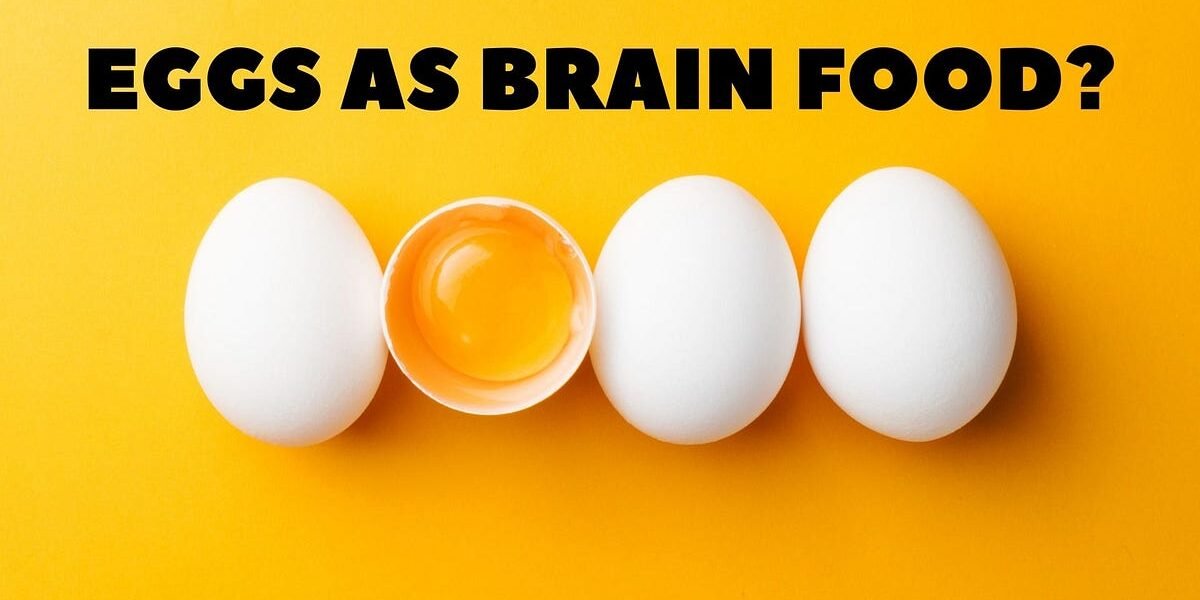Table of Contents
Think eggs are just for breakfast? Think again! These nutritional powerhouses are packed with brain-boosting nutrients that can sharpen your memory, improve your focus, and even elevate your mood. Let’s crack open the science behind why eggs are an egg-cellent choice for a healthier brain.
Why Eating Eggs Helps Your Brain
Eggs are a powerhouse of brain-boosting nutrients, including:
- Choline: Abundant in egg yolks, choline is a precursor to acetylcholine, a vital neurotransmitter for memory, focus, and mood regulation.
- Omega-3 Fatty Acids: Eggs, especially pasture-raised and organic varieties, are rich in DHA, a type of omega-3 crucial for building gray matter in the brain. Omega-3s also have anti-inflammatory properties and may reduce stroke risk.
- Cholesterol: Contrary to some beliefs, the cholesterol in egg yolks is essential for the production of vitamin D, various hormones, and the formation of brain cell membranes.
- B Vitamins: Eggs are a great source of essential B vitamins like B12, B6, and folate, all of which play vital roles in maintaining brain health.
In short, incorporating eggs into your diet is a smart choice for supporting optimal brain function and cognitive health.
So let’s dive into the details…
Eggs Helps Your Brain

I’m going to talk about the benefits of eating eggs for your brain. Very interesting, there’s quite a few things in an egg that will help you with your cognitive function and your mood and overall energy for your brain.
- Eggs contain nutrients that support cognitive function, mood, and energy levels.
Benefits of Eggs for Your Brain
Choline for Cognitive Function and Mood
The first thing is choline. Eggs are loaded with choline, and I’m talking about the egg yolk. Now, what is choline?
Well, choline is a precursor for acetylcholine, which is not only essential for cognitive function like memory, focus, and concentration, but for also maintaining a higher level mood, so it can actually bring you up.
- Choline, found abundantly in egg yolks, is a precursor to acetylcholine, a neurotransmitter crucial for:
- Memory
- Focus
- Concentration
- Mood regulation
Choline for Nutrient Absorption
On top of that, choline can help you act as a bile salt to help you improve the absorption of the fat-soluble nutrients which are necessary for the brain like vitamin A, vitamin D, vitamin E, vitamin K1, and vitamin K2 as well as the next nutrient which I’m going to talk about, which is omega-3 fatty acids.
- Choline aids in the absorption of fat-soluble vitamins essential for brain health:
- Vitamin A
- Vitamin D
- Vitamin E
- Vitamin K1
- Vitamin K2
Omega-3 Fatty Acids for Brain Structure and Health

So buying pasture-raised organic eggs are loaded with omega-3 fatty acids, specifically DHA, and your gray matter is made out of DHA. Plus, omega-3 fatty acids are anti-inflammatory and they can reduce the risk of clots as in preventing strokes.
- Pasture-raised organic eggs are rich in omega-3 fatty acids, particularly DHA:
- DHA is a key component of gray matter in the brain.
- Omega-3s have anti-inflammatory properties.
- Omega-3s may reduce the risk of stroke.
Cholesterol, Vitamins, and Ketones for Brain Function

Also, egg yolks are loaded with cholesterol, which is necessary for making vitamin D, making various hormones, and also providing the raw material for all of your cellular membranes in your brain.
Eggs are very keto-friendly; they’re very low in carbohydrate which will help you make ketones which the brain prefers. And eggs are a great source of B12, B6, and folate, which the brain also needs.
- Egg yolks contain cholesterol, vital for:
- Vitamin D production
- Hormone synthesis
- Brain cell membrane formation
- Eggs are low in carbohydrates, making them keto-friendly and promoting ketone production, an alternative energy source for the brain.
- Eggs supply essential B vitamins for brain health:
- Vitamin B12
- Vitamin B6
- Folate
Dispelling Myths About Eggs and Cholesterol
So don’t ever feel like these eggs are going to actually detract from your health in any way like they’re going to give you more cholesterol.
They’re actually going to support healthy levels of cholesterol; your body will then make less. But also, you have a lot of other benefits and one being supporting the brain.
- Contrary to popular belief, eggs do not negatively impact cholesterol levels and can actually support healthy cholesterol balance.
Summary
why eating eggs helps your brain.
- Eggs yolks provide choline, which boosts your cognitive function and mood. Choline also acts as a bile salt, which helps with absorbing fat-soluble nutrients.
- Eggs yolks provide omega-3 fatty acids, which help reduce inflammation, reduce the risk of blood clots and stroke, and provide the raw material for healthy brain grey matter.
- Eggs provide healthy cholesterol, which is important for the creation of vitamin D, cell membranes, and hormones.
- Eggs are low in carbs, which promotes ketosis.
- Eggs contain many important nutrients, including B12, B6, and folate.
Overall, eggs are incredible for supporting the health of your brain. They are a great addition to the Healthy Keto diet.
DATA
https://www.ncbi.nlm.nih.gov/pmc/articles/PMC10280906
FAQ
Why are eggs good for mental health?
Eggs are considered beneficial for mental health primarily due to their high content of choline, a nutrient that plays a crucial role in brain function. Choline is a precursor for acetylcholine, a neurotransmitter that is essential for memory and mood regulation. Additionally, eggs provide high-quality protein and essential fatty acids, which are vital for maintaining healthy brain cell membranes and supporting neurotransmitter function. Regular consumption of eggs may help improve cognitive performance and reduce the risk of cognitive decline as one ages.
What are 5 benefits of eating eggs?
- High Nutritional Value: Eggs are rich in essential nutrients, including proteins, vitamins (such as B12 and D), and minerals (like selenium and phosphorus).
- Supports Brain Health: The choline in eggs is linked to improved memory and cognitive function, making them a brain-healthy food.
- Promotes Eye Health: Eggs contain lutein and zeaxanthin, antioxidants that help protect against age-related macular degeneration and cataracts.
- Weight Management: High protein content in eggs can promote satiety, helping to control appetite and support weight loss.
- Heart Health: Recent studies suggest that moderate egg consumption does not increase heart disease risk and may improve heart health due to their nutrient profile.
What food gives the most brain power?
Foods that are particularly beneficial for brain power include:
- Fatty Fish: Rich in omega-3 fatty acids, which are crucial for brain health.
- Blueberries: Packed with antioxidants that may delay brain aging and improve memory.
- Turmeric: Contains curcumin, which has been shown to cross the blood-brain barrier and has anti-inflammatory and antioxidant benefits.
- Broccoli: High in antioxidants and vitamin K, which is believed to support brain health.
- Pumpkin Seeds: Contain antioxidants and a rich source of magnesium, iron, zinc, and copper, all of which are beneficial for brain function.
Do eggs help you study?
Yes, eggs can help enhance study performance due to their high choline content, which supports memory and cognitive function. The protein in eggs can also provide sustained energy, helping to maintain focus during long study sessions. The combination of nutrients found in eggs can contribute to improved concentration and mental clarity.
Benefits of boiled egg for brain
Boiled eggs offer numerous brain benefits, including:
- Choline Source: Supports neurotransmitter production, enhancing memory and cognitive function.
- Protein-Rich: Provides the necessary building blocks for neurotransmitters, aiding in brain communication.
- Low Calorie: A healthy snack option that provides essential nutrients without excess calories.
- Versatile: Can be easily incorporated into various meals and snacks, making them a convenient brain food.
Brain food for studying
Effective brain foods for studying include:
- Eggs: Rich in choline and protein.
- Nuts: Especially walnuts and almonds, which are high in omega-3 fatty acids and antioxidants.
- Dark Chocolate: Contains flavonoids that improve blood flow to the brain.
- Whole Grains: Provide glucose, which is the brain’s primary energy source.
- Leafy Greens: Such as spinach and kale, which are rich in vitamins and antioxidants.
Top 5 nuts for brain
- Walnuts: High in DHA, a type of omega-3 fatty acid that supports brain health.
- Almonds: Rich in vitamin E, which may help prevent cognitive decline.
- Hazelnuts: Contain healthy fats and antioxidants beneficial for brain function.
- Pistachios: Good source of vitamin B6, which is important for brain health.
- Brazil Nuts: High in selenium, which has been linked to improved mood and cognitive function.
Peanuts benefits for brain
Peanuts are beneficial for brain health due to their:
- High Protein Content: Supports neurotransmitter function.
- Rich Source of Niacin: Linked to reduced risk of Alzheimer’s disease.
- Antioxidants: Help combat oxidative stress, which can damage brain cells.
Eggs brain fog
Eggs may help alleviate brain fog due to their nutrient density. The choline in eggs supports acetylcholine production, which is critical for memory and cognitive clarity. A diet that includes eggs can help maintain stable energy levels and improve focus, potentially reducing feelings of mental fatigue.
Foods that are good for your brain and memory
- Fatty Fish: Omega-3 rich fish like salmon and sardines.
- Berries: Particularly blueberries, known for their antioxidant properties.
- Turmeric: Contains curcumin, which has anti-inflammatory effects.
- Broccoli: High in antioxidants and vitamin K.
- Oranges: A great source of vitamin C, which is key for preventing cognitive decline.
Bad food for brain
Foods to avoid for optimal brain health include:
- Trans Fats: Found in many processed foods, they can impair cognitive function.
- Sugary Drinks: Linked to decreased brain function and increased risk of cognitive decline.
- Highly Processed Foods: Often lacking in nutrients and high in unhealthy fats.
- Excessive Alcohol: Can lead to cognitive impairment and memory loss.
Is almond good for brain memory?
Yes, almonds are good for brain memory. They are rich in vitamin E, which is associated with improved cognitive function and a lower risk of Alzheimer’s disease. The healthy fats and antioxidants in almonds also support overall brain health, making them a great snack for enhancing memory and cognitive abilities.




